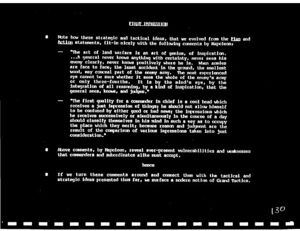Patterns of Conflict
| The works of |
| Works of John Boyd |
|---|
OODA WIKI Edition
Quantico Transcription
And I call this the second impression. Now let’s work— look at the first bullet, the first impression. And I go back to Napoleon. Some comments made by Napoleon. I’ll let you read them. And what I’m showing you here, his comments really fit in very nice with our plan and action statements. Fit in nice, I mean, his— yeah. These tactic— these, Patton strategic and tactical— you know, the plan, you’re sort of thinking strategically, the action you’re thinking tactically. You see what I’m saying? In that sense, they fit in nicely with the following comments by Napoleon. I’ll let you read it and then comment on it. Getting tongue-tied here.
[long pause as audience reads slide]
Anybody? What does that—what do those two paragraphs tell you? Or those two passages. What do those two passages really tell you? What’s Napoleon tell you? Just give it me very condensed, what he’s saying. I want it very condensed, very succinct.
Audience: Fog of war. It’s always there.
Boyd: That’s right. Which means what then? What do you want to do? Knowing that all—what he’s saying, all human beings, even the genius that he was, Napoleon and the commanders, this is a big problem for him. And it’s something they have to resolve, right? I mean, that’s what he’s saying. I mean, I don’t care whether you like his language or not, but basically, that’s what he’s telling you. You might say, “Well, I wish he would have said it different.” That’s not the argument. I don’t care whether he said it differently or not. That’s the message. And if you think about it yourself, that’s really a true message. That’s really true. What is he really saying? If that’s the case, that’s a vulnerability that all human beings have. What you want to do is feed that vulnerability to them. That’s a weakness or vulnerability. You want to turn the argument around, say, “Oh, is that the problem? We’re going to make it even tougher, then he’ll never be able to do it.” Reveal ever-present vulnerabilities. What is this? So if we turn these arguments around, you want to play to that. You want to lever that, because it’s a natural human condition.
You want to lever that natural human condition, if you’re in a conflict situation. Okay? So we’re going to do that.
So putting together the stuff we’ve been talking about here, when you want to think about grand tactics, or operational level, or whatever you want to call it, or like you Marines like to call it, campaigning, which is all right too. I just use the old-fashioned term.
